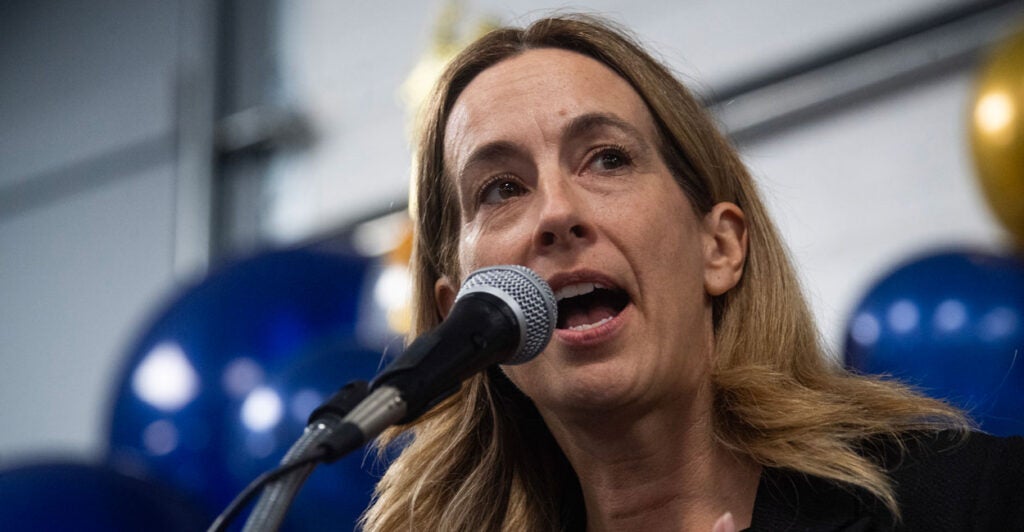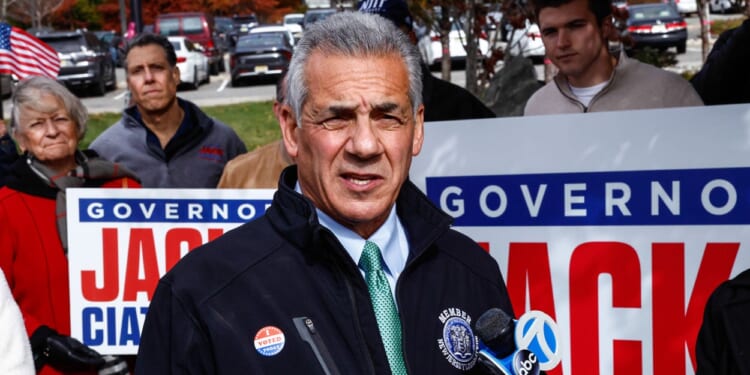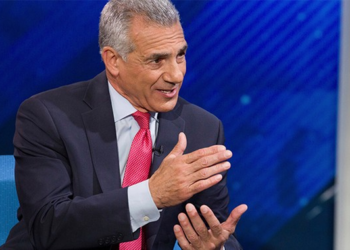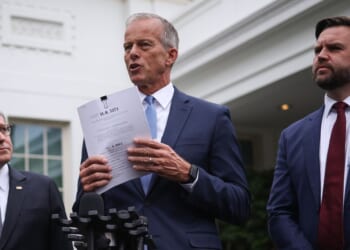Rising energy prices and record-high property taxes are among the top issues driving voters to the polls in a close, competitive gubernatorial election set for Tuesday.
Jack Ciattarelli, a businessman and former Republican assemblyman who nearly unseated incumbent Democrat Gov. Phil Murphy in 2021, is taking on Rep. Mikie Sherrill, the Democrat nominee.
While New Jersey is a traditionally blue state where Democrats hold a significant registration advantage, recent polls show the candidates are neck and neck.

The Democratic candidate for New Jersey governor, Mikie Sherrill, addresses a campaign event in Westville, New Jersey, on Oct. 11. (Matthew Hatcher/Getty Images)
Beginning in June, New Jersey residents experienced a 20% increase in electricity prices that figures into broader concerns about affordability throughout the state. Ciattarelli affixes the blame for the spike in utility bills on policies Murphy has implemented in Trenton and Sherrill has pursued in Washington.
The candidates have staked out vastly different approaches on energy policy.
Ciattarelli has pledged to withdraw New Jersey from the Regional Greenhouse Gas Initiative, a multistate carbon tax plan known as “RGGI” (and pronounced as “Reggie”) built around “cap-and-trade” regulations.
Under Murphy, New Jersey rejoined RGGI in 2021 after his predecessor, Republican Gov. Chris Christie, pulled the state out of it.
In addition to delivering regulatory relief, Ciattarelli is also looking to reopen power plants Murphy shut down—and potentially open new ones. The Republican has also expressed support for expanding nuclear power.
For her part, Sherrill has not specifically endorsed RGGI, but she has expressed support for green energy policies in line with RGGI’s goals. Sherrill has pledged to declare a “state of emergency” on utility costs and freeze utility rates.
Sherrill, who has represented the state’s 11th Congressional District since 2019, also supports Murphy’s plan to make New Jersey a 100% clean energy state by 2035.
Ciattarelli has spent part of his campaign working to tie Sherrill in with Murphy, who has a minus-9 point negative approval rating in the state, while Sherrill has attempted to weigh her Republican opponent down with voter antagonism toward President Donald Trump.
But Kenny Stein, vice president of policy for the Institute of Energy Research, told The Daily Signal that the decisive factor could be voter fatigue with green energy mandates that have created upward pressure on energy prices.
Sherrill and other Democrats have been critical of Trump’s “One Big, Beautiful Bill,” claiming that removal of subsidies is responsible for the recent spike in energy prices.
Stein disputes that reasoning.
“One big problem with this argument is that it will be several years before these subsidies expire,” he explained. “The One Big, Beautiful Bill ends the Production Tax Credit and the Investment Tax Credit for wind and solar facilities placed in service after Dec. 31, 2027, and for those facilities where construction did not begin before July 4, 2026.
“Let’s also not forget there is a carveout for projects that begin construction over the next year or so that could then be eligible for subsidies starting as late as 2030. What’s really key here is what’s happening at the state level and what kind of regulations are going in place locally,” he said, adding: “New Jersey could serve as a test bed for where voters fix the blame for rising costs.”
Property Taxes, Education
New Jersey has the highest property taxes in the nation, with the average homeowner’s bill now hovering around $10,000 a year. Since the state’s public schools are heavily reliant on property taxes, any discussion of tax reform almost always intersects with education policy.
Ciattarelli views the current school funding formula as unconstitutional. He argues that it violates the equal benefit provisions of the state constitution.
He has committed himself to setting “a statewide standard on per-pupil spending” and then allowing “that money to follow the student,” according to his campaign website. He also supports various school choice initiatives, including the expanded use of charter schools.
Ciattarelli views Florida’s school choice voucher program as a model for what could be done in New Jersey.
Sherrill’s “Affordability Agenda” includes a mix of tax credits and rebates. Her education plan revolves around a transparency initiative she describes as the “The New Jersey Report Card” that includes an online portal that points to state-funded payments, contracts, and programs.
Sherrill does not support private school choice initiatives, such as vouchers, but has expressed some support for charter schools.
Recent figures show Democrats have a roughly 896,350 voter registration advantage over Republicans, but that figure is down from more than 1 million just a few years ago.
Moreover, Trump made significant gains in the state during his 2024 run and came within 6 points of upsetting then-Vice President Kamala Harris. Then there’s Ciattarelli himself, who finished only about 3 points behind Murphy when the governor’s race was finally called in 2021.
There’s a historical precedent for tax revolts upending gubernatorial races in New Jersey. Then-Democrat Gov. Jim Florio lost his bid for reelection in 1993 after pushing through a record $2.8 billion tax hike.
Richard LaRossa remembers those days. He is a former New Jersey Republican state senator who represented parts of Mercer County. His surprise victory in the wake of the tax revolts gave Republicans a veto-proof majority in the legislature. LaRossa sees a similar dynamic at work today Ciattarelli is attracting support from independents and Democrats.
“No matter what the party affiliation, it’s hard to not realize how far to the left Democrats have gone and that there are dozens of Democrats who are either changing parties or supporting Jack Ciattarelli,” he said.
Ciattarelli has been endorsed by a number of prominent New Jersey Democrats, including mayors.
LaRossa also cites some sobering figures he thinks could help move the needle for Republicans.
“It took 238 years for [New Jersey’s] budget to reach $32 billion,” he said. “But it only took only seven years to reach $57 billion, a 75% increase. It’s simple, no one in New Jersey can afford Democrats any longer. We need fiscal restraint and fiscal accountability. That will only happen with Jack Ciattarelli in New Jersey’s governor’s office.”
State figures point to a sizable number of unaffiliated voters in New Jersey. In fact, unaffiliated voters may be the largest bloc of voters, even outnumbering Democrats. Whichever candidate wins over the unaffiliated will most likely win the election.
In-person early voting in New Jersey began on Oct. 25 for the Nov. 4 election.

















